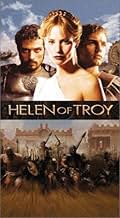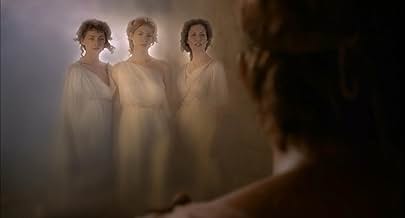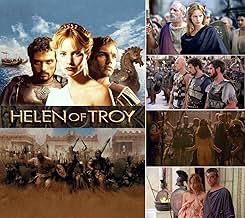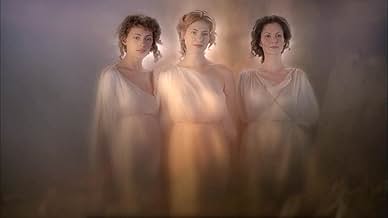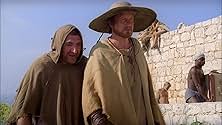Aggiungi una trama nella tua linguaThe abduction of beautiful Helen, wife of Spartan King Menelaus, by Paris of Troy triggers a long war.The abduction of beautiful Helen, wife of Spartan King Menelaus, by Paris of Troy triggers a long war.The abduction of beautiful Helen, wife of Spartan King Menelaus, by Paris of Troy triggers a long war.
- Candidato a 1 Primetime Emmy
- 1 vittoria e 7 candidature totali
Sfoglia gli episodi
Recensioni in evidenza
The Helen of Troy miniseries on USA today failed apparently because the writer lacked the nerve to tell the classic story, and instead made up his own. Instead of using Homer's Illiad as a starting point, the TVsters seemed to turn to the 1956 film as the primary source--turning the seduction/kidnap of Helen into a big ol' love story.
So many key elements were missing: the interventions of the gods, the quarrel between Achilles and Agamemnon, the killing of Patroclus in Achilles armor, Achilles subsequent killing of Hector, etc. This was the storyline of what we know of the myth of the Trojan War.
And major characters are triviliazed or disappeared: Hector's glory on TV is as a second banana to Paris; mighty Ajax gets a mention, little more; Diomedes, Nestor, Idonmoneus are absent. On the Trojan side, Aeneas, Sarpedon, Glaucus, Deiphobus and others are equally invisible.
Agamemnon is seen, not as a hero with the fatal flaw of hubris but a Hitlerian monster. Menaleas, a strong warrior in the Illiad, seems like he attended all the sensitivity training classes avaiable to the Achians, (the Greeks were referred to as "the Ageans" in the series), but wasn't much of a fighter.
But my biggest beef is with the character of Paris (Helen seemed commonplace, but acceptable). Paris was not much of a hero in the Illiad; actually, he was a bit of a feckless bounder. Helen's feelings toward him were decidedly mixed, with lust, pity, and contempt thrown together. Hector upbraided Paris on several occasions for his cowardice and sloth, but then, Paris occasionally entered the fray as an experienced soldier as well.
I sense the writers chickened out of grappling with a different kind of plot, and thereby missed an opportunity. The difficult interplay among the Greek heroes, the complicated moral choices on both sides, the tragic savagery of war, while existing to small degrees in the series, took back seat to a more or less conventional love story.
Too bad. Production values were fair, and some of the elements were there to make something better.
So many key elements were missing: the interventions of the gods, the quarrel between Achilles and Agamemnon, the killing of Patroclus in Achilles armor, Achilles subsequent killing of Hector, etc. This was the storyline of what we know of the myth of the Trojan War.
And major characters are triviliazed or disappeared: Hector's glory on TV is as a second banana to Paris; mighty Ajax gets a mention, little more; Diomedes, Nestor, Idonmoneus are absent. On the Trojan side, Aeneas, Sarpedon, Glaucus, Deiphobus and others are equally invisible.
Agamemnon is seen, not as a hero with the fatal flaw of hubris but a Hitlerian monster. Menaleas, a strong warrior in the Illiad, seems like he attended all the sensitivity training classes avaiable to the Achians, (the Greeks were referred to as "the Ageans" in the series), but wasn't much of a fighter.
But my biggest beef is with the character of Paris (Helen seemed commonplace, but acceptable). Paris was not much of a hero in the Illiad; actually, he was a bit of a feckless bounder. Helen's feelings toward him were decidedly mixed, with lust, pity, and contempt thrown together. Hector upbraided Paris on several occasions for his cowardice and sloth, but then, Paris occasionally entered the fray as an experienced soldier as well.
I sense the writers chickened out of grappling with a different kind of plot, and thereby missed an opportunity. The difficult interplay among the Greek heroes, the complicated moral choices on both sides, the tragic savagery of war, while existing to small degrees in the series, took back seat to a more or less conventional love story.
Too bad. Production values were fair, and some of the elements were there to make something better.
I disagree with the reviewer who thinks Paris is prettier than Helen. Sienna Guillory is gorgeous! As in the Iliad Paris & Helen are a matched pair. I also disagree with the reviewer who panned the movie because it was not faithful to the Iliad. No movie, not even a TV miniseries, can be expected to be totally faithful to any book. A movie is always a selection. The question should not be what was omitted, or whether it compressed or altered the text for cinematic purposes. Of course it did! The question is whether or not it captured the spirit of the original, or whether it did violence to that spirit, as too many movies do. In my view this movie captured the spirit of the Iliad surprisingly well. Perhaps the Greek heroes, especially Agamemnon, do not come off as heroically as the modern viewer has come to expect. But then our idea of heroism, (confused as it too often is with idealism), is not Homer's; and, then again, this movies portrayal of the Greeks as devious aggressors plotting the conquest of Troy is both historically accurate and does nothing to distort Homer's portrait of them. He certainly would have agreed. I did feel that the movie became somewhat rushed at the end. Unfortunately, this seems to be a common problem with many movies based on classic works of literature. The director seems to lavish most of his energy and resources on the beginning and middle of the story. Then, as time and money begin to run out, the ending becomes hurried, episodes are combined, the story becomes perilously compressed. But even here, the movie does not really leave the viewer disappointed. The scene in which the Trojan Horse suddenly appears without explanation outside the walls of Troy is particularly effective, because it appears to the viewer just as it must have appeared to the Trojans. Even though one may wish for more, nothing in the movie's ending distorts Homer's tale of the fall of Ilium.
There were several images that were important in the movie. Helen really stood out to be the most beautiful woman at that time but there were a lot of differences from the text. In the movie, what she showed the audience was a childish lady who suddenly turns into a flirt. Sometimes, it is also hard to grasp her true emotions probably because this flirt image has enveloped her identity in the movie. What I admired about Paris was not his cute face. It is true that he looks fit for the character of Paris but what's more to that is you could see in his face his passion for whatever he's doing and saying. The image of a "pretty boy" was really fit for him. I am very fascinated with how Agamemnon was able to internalize his character very well. He portrayed a king who was really greedy but also showed a soft side. His facial expressions were also stunning especially his eyes. His portrayal of Agamemnon's character was constant all throughout the movie. Menelaus' identity was hard to depict because his identity in the Iliad was not totally exposed. What was admirable in him in the movie was his being a nice man or prince. I saw in him the change from the beginning of the movie to the end. You could see in him his sincerity in changing. Although Hector only had a small part, he was able to show the audience a noble Trojan. His image in the movie was different from the original text. He was not the strongest Trojan and he was even overpowered by his brother, Paris. Achilles was a totally different character. He was just a war and bloodthirsty warrior in the movie. It's as if he's just a bully in Helen of Troy.
The technical aspects for me were not that good. The voices were hardly audible. Sometimes, it's as if the actors and actresses were just murmuring to each other although the background music was suitable for the movie. It made you imagine what it was like before and how it felt during that time. There were scenes that were too dark that the characters could not be seen anymore but the shade of colors used were suitable for the time being illustrated in the movie. There were angles wherein a character was blocking someone else and it made it so hard to feel and see what's really happening but there were also shots that were nice. This was particular with the wooden horse. The angle of the shot made the wooden horse look so majestic and the audience would really be at awe with how the Greeks were able to come up with that plan and how they were able to make that wooden horse.
Overall, Helen of Troy is something worthwhile to watch not only because of Paris' look but also because the movie gave explanations on how things came to be and it brought its audience closer to the "reality" of the Iliad.
The technical aspects for me were not that good. The voices were hardly audible. Sometimes, it's as if the actors and actresses were just murmuring to each other although the background music was suitable for the movie. It made you imagine what it was like before and how it felt during that time. There were scenes that were too dark that the characters could not be seen anymore but the shade of colors used were suitable for the time being illustrated in the movie. There were angles wherein a character was blocking someone else and it made it so hard to feel and see what's really happening but there were also shots that were nice. This was particular with the wooden horse. The angle of the shot made the wooden horse look so majestic and the audience would really be at awe with how the Greeks were able to come up with that plan and how they were able to make that wooden horse.
Overall, Helen of Troy is something worthwhile to watch not only because of Paris' look but also because the movie gave explanations on how things came to be and it brought its audience closer to the "reality" of the Iliad.
I can't believe that the writers of this miniseries read any of the myths or the Iliad itself. The inconsistencies were truly amazing. But I guess it didn't matter, as the plot seemed to revolve around fighting and nudity. First of all Cassandra could not have told her father to kill the infant Paris; she did not receive her powers until she was a young woman. Apollo wanted her; she said yes and received the gift of prophecy; then, when she refused him, he could not take it back but cursed her that no one would believe her. Helen was not kidnapped by Theseus! Clytemnestra had three children, and Orestes and Elektra helped her wreak her vengeance for the death of Iphigenia. The gods & goddesses took a much more active part in the war, with Aphrodite telling Paris where to shoot Achilles and Athena guiding Odysseus, her favorite. The arrow in the heel meant nothing without the explanation. Agamemnon took Cassandra as part of his spoils. Hector had a wife, Andromache, whom he adored. Where was she? Where was Ajax?This was just too far from canon. One thing I did like was the loving relationship between Clytemnestra and her daughter Iphigenia; it was very understandable why she would kill Agamemnon.
As for the actors, Helen was not that beautiful. It was good to see John Rhys-Davies, but he was too thin and did not look well. Maryam D'Abo was made to look too old--an older actress should have been cast. She's still a Bond girl to me! Achilles was overplayed, and there was no reason for him to be bald. I did like Odysseus, however.
I'm not really sorry I watched it, just a little ashamed of myself for sticking out the whole four hours.
As for the actors, Helen was not that beautiful. It was good to see John Rhys-Davies, but he was too thin and did not look well. Maryam D'Abo was made to look too old--an older actress should have been cast. She's still a Bond girl to me! Achilles was overplayed, and there was no reason for him to be bald. I did like Odysseus, however.
I'm not really sorry I watched it, just a little ashamed of myself for sticking out the whole four hours.
Unlike the epic TROY, which spent much time and money recreating the spectacle of the Trojan War with CGI, the emphasis here is on the political ambitions and prophecies leading up to the start of the siege of Troy. Rufus Sewell as Agamemnon gives a performance (as the man who would conquer Troy) which eerily evokes Oliver Reed at his sinister best, as he makes it clear that the romance of Helen and Paris was merely a convenient excuse for the events that followed, and that the war came out of his own thirst for conquest. Sienna Guillory is attractive as Helen, but her role is rapidly reduced to that of a bystander in the great events that swirled around her. And the film makes clear its logic about this: how could a woman be responsible for a war in a time when even princesses were chattels of the royal houses to be auctioned off in marriage for political gain? As it deals more intimately with its characters and looks more closely at social power structures and gender roles of the period, this film is much more interesting as a human drama than the rather empty spectacle TROY.
Lo sapevi?
- QuizThis adaptation changes several aspects of the original legend of Helen. The gods play almost no role in the characters' lives, Helen is not shown to have any children and it's not explained how Cassandra supposedly got her powers. Instead, the series plays the story like a brutal historical event with little supernatural elements.
- BlooperIt is mentioned three times that Troy is the gateway to the riches of Byzantium. The city of Byzantium was founded in 667BC five centuries after the Trojan War.
- ConnessioniReferenced in In Praise of Action (2018)
I più visti
Accedi per valutare e creare un elenco di titoli salvati per ottenere consigli personalizzati
- How many seasons does Helen of Troy have?Powered by Alexa
Dettagli
- Tempo di esecuzione
- 1h 28min(88 min)
- Colore
- Mix di suoni
- Proporzioni
- 1.78 : 1
Contribuisci a questa pagina
Suggerisci una modifica o aggiungi i contenuti mancanti


